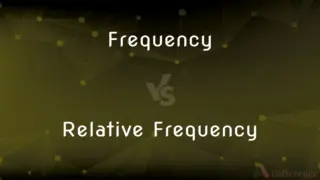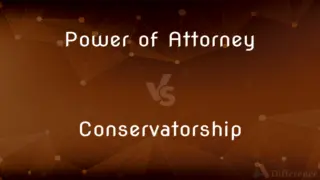Morality vs. Ethics — What's the Difference?
Edited by Tayyaba Rehman — By Urooj Arif — Updated on May 9, 2024
Morality refers to personal or societal beliefs about right and wrong, while ethics is the systematic study or set of rules governing those beliefs, often within professional or philosophical contexts.

Difference Between Morality and Ethics
Table of Contents
ADVERTISEMENT
Key Differences
Morality encompasses an individual's or society's principles, values, and rules that distinguish right from wrong. It is often shaped by cultural, religious, or personal influences, such as treating others with kindness or upholding honesty. Ethics, on the other hand, is a structured discipline or framework used to analyze, systematize, and govern moral principles, often within professions or philosophical discourse. For example, medical ethics dictate how healthcare providers should act to maintain patient welfare and confidentiality.
Morality tends to be more intrinsic and personal, varying between individuals or communities based on upbringing or cultural norms. In contrast, ethics aims to apply consistent standards across different scenarios, professions, or organizations.
Ethics often involves establishing specific codes, like legal or business ethics, which provide practical guidance. Meanwhile, morality remains more abstract, driven by broader societal norms like justice or compassion.
While morality shapes personal behavior, ethics provides systematic guidelines that help navigate complex situations where moral choices might conflict.
Comparison Chart
Definition
Personal or societal beliefs about right and wrong
Structured study or framework governing moral beliefs
ADVERTISEMENT
Basis
Cultural, religious, and personal influences
Philosophical principles, professional standards
Scope
Individual or community values
Broader frameworks for systematic analysis
Application
Personal behavior and societal norms
Codes or rules in professions or organizations
Example
Treating others kindly
Medical ethics, legal ethics
Compare with Definitions
Morality
Religious or cultural norms.
Religious teachings often influence a person's sense of morality.
Ethics
Professional or philosophical guidelines.
The company's ethics policy outlines acceptable business practices.
Morality
Principles distinguishing right from wrong.
Her morality is based on the principle of treating others with respect.
Ethics
Rules or codes of conduct.
Journalistic ethics emphasize truth and objectivity in reporting.
Morality
Values shaped by personal or societal beliefs.
Morality in this community emphasizes cooperation.
Ethics
Framework for resolving moral dilemmas.
Legal ethics guide lawyers in handling client confidentiality.
Morality
Ethical behavior guided by internal beliefs.
He acted out of his own morality when helping the homeless.
Ethics
Structured system of moral principles.
Medical ethics require doctors to prioritize patient well-being.
Morality
Abstract ideas like honesty and justice.
Morality encourages fairness and honesty in one's actions.
Ethics
Study of moral philosophy.
His research in ethics explores the concept of universal human rights.
Morality
Morality (from Latin: moralitas, lit. 'manner, character, proper behavior') is the differentiation of intentions, decisions and actions between those that are distinguished as proper (right) and those that are improper (wrong). Morality can be a body of standards or principles derived from a code of conduct from a particular philosophy, religion or culture, or it can derive from a standard that a person believes should be universal.
Ethics
Ethics or moral philosophy is a branch of philosophy that "involves systematizing, defending, and recommending concepts of right and wrong behavior". The field of ethics, along with aesthetics, concerns matters of value; these fields comprise the branch of philosophy called axiology.Ethics seeks to resolve questions of human morality by defining concepts such as good and evil, right and wrong, virtue and vice, justice and crime.
Morality
The quality of being in accord with standards of right or good conduct
Questioned the morality of my actions.
Ethics
Moral principles that govern a person's behaviour or the conducting of an activity
A code of ethics
Medical ethics also enter into the question
Morality
A system or collection of ideas of right and wrong conduct
Religious morality.
Christian morality.
Ethics
The branch of knowledge that deals with moral principles
Neither metaphysics nor ethics is the home of religion
Morality
Virtuous conduct
Commended his morality.
Ethics
A set of principles of right conduct.
Morality
A rule or lesson in moral conduct
Sermons noted for their moralities.
Ethics
A theory or a system of moral values
"An ethic of service is at war with a craving for gain" (Gregg Easterbrook).
Morality
(uncountable) Recognition of the distinction between good and evil or between right and wrong; respect for and obedience to the rules of right conduct; the mental disposition or characteristic of behaving in a manner intended to produce morally good results.
Ethics
Ethics (used with a sing. verb) The study of the general nature of morals and of the specific moral choices to be made by a person; moral philosophy.
Morality
(countable) A set of social rules, customs, traditions, beliefs, or practices which specify proper, acceptable forms of conduct.
Ethics
Ethics (used with a sing. or pl. verb) The rules or standards governing the conduct of a person or the members of a profession
Medical ethics.
Morality
(countable) A set of personal guiding principles for conduct or a general notion of how to behave, whether respectable or not.
Ethics
(philosophy) The study of principles relating to right and wrong conduct.
Morality
A lesson or pronouncement which contains advice about proper behavior.
Ethics
Morality.
Morality
(countable) A morality play.
Ethics
The standards that govern the conduct of a person, especially a member of a profession.
Morality
Moral philosophy, the branch of philosophy which studies the grounds and nature of rightness, wrongness, good, and evil.
Ethics
The science of human duty; the body of rules of duty drawn from this science; a particular system of principles and rules concerting duty, whether true or false; rules of practice in respect to a single class of human actions; as, political or social ethics; medical ethics.
The completeness and consistency of its morality is the peculiar praise of the ethics which the Bible has taught.
Morality
A particular theory concerning the grounds and nature of rightness, wrongness, good, and evil.
Ethics
Motivation based on ideas of right and wrong
Morality
The relation of conformity or nonconformity to the moral standard or rule; quality of an intention, a character, an action, a principle, or a sentiment, when tried by the standard of right.
The morality of an action is founded in the freedom of that principle, by virtue of which it is in the agent's power, having all things ready and requisite to the performance of an action, either to perform or not perform it.
Ethics
The philosophical study of moral values and rules
Morality
The quality of an action which renders it good; the conformity of an act to the accepted standard of right.
Of moralitee he was the flower.
I am bold to think that morality is capable of demonstration.
Morality
The doctrines or rules of moral duties, or the duties of men in their social character; ethics.
The end of morality is to procure the affections to obey reason, and not to invade it.
The system of morality to be gathered out of . . . ancient sages falls very short of that delivered in the gospel.
Morality
The practice of the moral duties; rectitude of life; conformity to the standard of right; virtue; as, we often admire the politeness of men whose morality we question.
Morality
A kind of allegorical play, so termed because it consisted of discourses in praise of morality between actors representing such characters as Charity, Faith, Death, Vice, etc. Such plays were occasionally exhibited as late as the reign of Henry VIII.
Morality
Intent; meaning; moral.
Taketh the morality thereof, good men.
Morality
Concern with the distinction between good and evil or right and wrong; right or good conduct
Morality
Motivation based on ideas of right and wrong
Common Curiosities
Is morality universal or relative?
Morality is often relative, shaped by culture, religion, and personal experiences.
Why are ethics important in professions like medicine or law?
Ethics help maintain public trust by ensuring professionals act in their clients' or patients' best interests.
Are morality and religion always connected?
Not necessarily, as secular moral systems can exist independently of religious beliefs.
What is the difference between morality and ethics?
Morality refers to personal or societal beliefs about right and wrong, while ethics is a systematic framework for analyzing these beliefs.
Can someone have personal morality but lack ethics?
Yes, someone may have strong personal values but might not follow a structured ethical framework.
Are ethical guidelines consistent across professions?
No, different professions have unique ethical codes suited to their specific challenges.
Are there ethical principles accepted universally?
Some principles, like respect for human rights, are widely accepted but not universal.
Is ethics only relevant to professionals?
No, ethics can guide personal conduct beyond professional contexts.
Is studying ethics beneficial for personal growth?
Yes, understanding ethics can improve decision-making and develop a well-rounded perspective.
Can ethics and morality conflict?
Yes, ethical codes may sometimes clash with an individual's personal moral beliefs.
Can a company have its own morality?
Companies may not have morality but can adopt ethical policies aligned with their values.
What role does philosophy play in ethics?
Philosophy provides theoretical frameworks to understand and analyze ethical principles.
Do societal norms influence ethical standards?
Yes, changing societal norms often lead to evolving ethical guidelines.
Do all countries have the same ethical standards?
No, ethical standards vary widely across cultures and legal systems.
Can moral values evolve over time?
Yes, moral values often change with new cultural, societal, or scientific developments.
Share Your Discovery

Previous Comparison
Particularly vs. Especially
Next Comparison
Wind vs. AirAuthor Spotlight
Written by
Urooj ArifUrooj is a skilled content writer at Ask Difference, known for her exceptional ability to simplify complex topics into engaging and informative content. With a passion for research and a flair for clear, concise writing, she consistently delivers articles that resonate with our diverse audience.
Edited by
Tayyaba RehmanTayyaba Rehman is a distinguished writer, currently serving as a primary contributor to askdifference.com. As a researcher in semantics and etymology, Tayyaba's passion for the complexity of languages and their distinctions has found a perfect home on the platform. Tayyaba delves into the intricacies of language, distinguishing between commonly confused words and phrases, thereby providing clarity for readers worldwide.















































